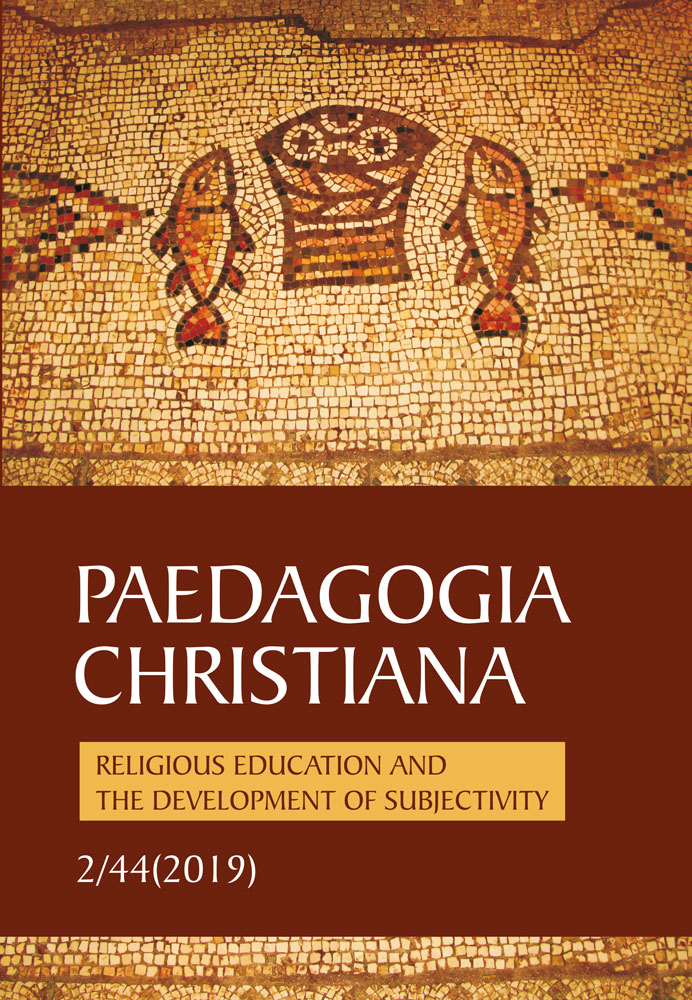Erasmus of Rotterdam as a Teacher of Christian Humanism
DOI:
https://doi.org/10.12775/PCh.2019.042Keywords
humanism, Christianity, pedagogy, religious education, teacher, pupil, nurtureAbstract
The text presents the life and thought of Erasmus of Rotterdam as a humanist, an educator and a priest, and then tries to describe the Erasmian concept of humanistic religious education as arising from these three levels and ways of thinking. The purpose of this research is twofold: on the one hand, it aims to recreate this historical thought with the ambition to bring out its distinguishing features; while on the other, it is assumed that this concept can be useful to those of us today who are interested or responsible for the current shape of religious education, in theory and practice.
References
Cytowska, Maria. “Od tłumacza”. In: Erazm z Rotterdamu, Pisma moralne. Wybór, 5–26. Warszawa: PIW, 1970.
Erasmus and Luther. The Battle over Free Will, ed. by Clarence H. Miller. Transl. Clarence Miller, Peter Macardle. Indianapolis, Cambridge: Hackett Publishing Company Inc., 2012.
Erasmus. Christian Humanism and the Reformation. Selected Writings of Erasmus, ed. John Olin. New York: Fordham University Press, 1975.
Erasmus. “A Declamation on the Subject of Early Liberal Education for Children. De pueris statim ac liberaliter instituendis declamation”. Transl. Beert C. Verstraete. In: Collected Works of Erasmus, vol. 26, ed. J.K. Sowards, 291–346. Toronto, Buffalo, London: University of Toronto Press, 1985.
Erasmus. “On Good Manners for Boys. De civilitate morum puerilium”. Transl. Brian McGregor. In: Collected Works of Erasmus, vol. 25, ed. J.K. Sowards, 273–289. Toronto, Buffalo, London: University of Toronto Press, 1985.
Erasmus of Rotterdam. A Handbook of Good Manners for Children. Transl. Eleanor Merchant. London: Preface Publishing, 2008.
Erasmus. “The Handbook of the Christian Soldier. Enchiridion militis christiani”. In: Collected Works of Erasmus, vol. 66, ed. John W. O’Malley, 1–127. Toronto, Buffalo, London: University of Toronto Press, 1988.
Erasmus, Desiderius. The Praise of Folly and Other Writings, ed. Robert Adams. New York, London: W.W. Norton & Company, 1989.
Erasmus. “A Warrior Shielding. A Discussion of Free Will against Enslaved Will by Martin Luther, book one. Hiperaspistes liber unus”. Transl. Clarence H. Miller. In: Collected Works of Erasmus, vol. 76, ed. by Charles Trinkaus, 91–298. Toronto, Buffalo, London: University of Toronto Press, 1999.
Erasmus. “The Whole Duty of Youth”. In: Collected Works of Erasmus, vol. 39, ed. James K. McConica, 88–108. Toronto, Buffalo, London: University of Toronto Press, 1997.
Kimball, Bruce. Orators & Philosophers. A History of the Idea of Liberal Education. New York and London: Teachers College, Columbia University, 1986.
Kołakowski, Leszek. “Erazm i jego Bóg”. In: Erazm z Rotterdamu, Podręcznik żołnierza Chrystusowego, transl. Juliusz Domański, VII–XVIII. Warszawa: PWN, 1965.
Margolin, Jean-Claude. “Erazm z Rotterdamu”. In: Myśliciele o wychowaniu, vol. 1, 339–361. Warsaw: Polska Oficyna Wydawnicza „BGW”, 1996.
Rummel, Erika. “Desiderius Erasmus”. In: The Stanford Encyclopedia of Philosophy (Winter 2017 Edition), ed. Edward N. Zalta. https://plato.stanford.edu/archives/win2017/entries/erasmus/ [access: 01.09.2019].
Woodward, William Harrison. Desiderius Erasmus concerning the Aim and Method of Education. Cambridge: the University Press, 1904.
Zweig, Stefan. Tryumf i tragizm Erazma z Rotterdamu. Transl. R. Centwerszwerowa. Warszawa: Wydawnictwo J. Przeworskiego, 1936.
Downloads
Published
How to Cite
Issue
Section
Stats
Number of views and downloads: 2225
Number of citations: 0



